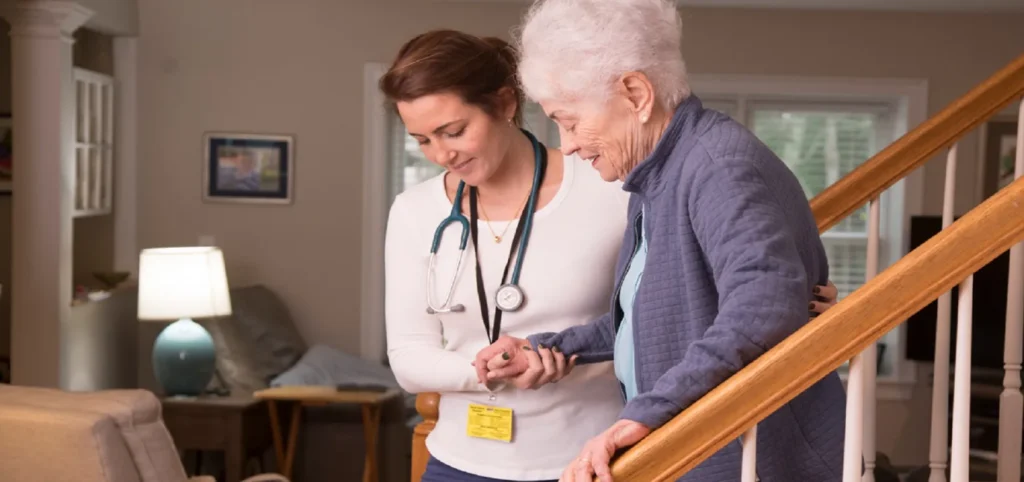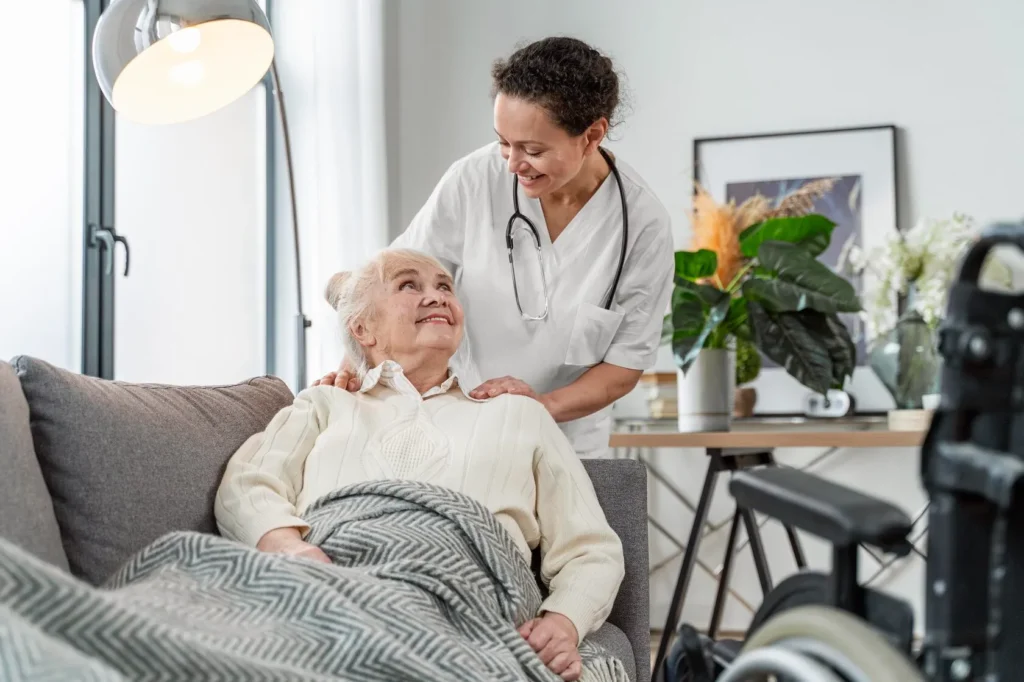Lorem ipsum dolor sit amet, consectetur adipiscing elit ut elit tellus.
As our parents get older, we often feel worried and confused, and we don’t know when it’s time to step in. Aging gracefully may sound like a poetic phrase, but in reality, it means going through small changes in your health, skills, and behavior. Even though these changes happen slowly, they can have a big effect on safety and quality of life. It is important to know when occasionally forgetting things, losing your balance, or withdrawing emotionally become red flags. At this point in life, you need to understand, care about, and act. Giving your elderly folks the right kind of help doesn’t mean taking over their lives; it means making them more independent. The first step toward effective intervention is to know the signs.
It can be hard on your emotions to take care of old parents. Adult children often feel a lot of different feelings at once, ranging from guilt and worry to anger and exhaustion. Caring for others while also having personal and work obligations can make you tired, especially if your siblings don’t agree or live far away. There are a lot of kids who don’t know what to do or feel ready, and they wonder if they’re doing the right thing. It’s important to recognize these thoughts and get help, like through therapy, short-term care, or family meetings. Remember that taking care of yourself is not selfish; it’s necessary to keep up the kindness and energy your loved one needs from you.
People often think of small memory loss as “senior moments,” but if it happens a lot, it can be a sign of cognitive decline. Looking out for asking the same questions over and over, losing things and finding them in strange places, or having trouble understanding conversations. Having trouble focusing on time or place and making decisions can also be early signs of Alzheimer’s or dementia. It’s time for a professional review if your parents get lost in places they’re used to or have trouble planning their daily activities. Finding it early can help with management and planning care, which can make life better and slow the disease’s growth. As the saying goes, “don’t ignore the small signs.”
Losses in physical health often show up in the form of everyday problems. You may have trouble walking steadily, get cuts from falling, or have trouble getting up from sitting down. Losing weight, not taking care of your cleanliness, or having trouble climbing stairs are also signs of trouble. These changes make it harder to move around and worry about safety and self-care. Long-term illnesses like arthritis, osteoporosis, or heart disease can slowly make it harder for your parents to do things on their own. By taking care of these signs right away, you can avoid crashes and trips to the hospital. A full medical exam can help find the root reasons and identify whether home modifications or personal care help are required.
Food is an important part of health, but people often forget about it as they get older. If you skip meals, lose a lot of weight, or eat too many prepared foods, it could mean that you have deeper problems. It could be because they forget, don’t want to eat, or can’t go shopping or cook. Sometimes it’s because they don’t want to eat alone—that can be annoying. Poor diet can make health problems worse, make healing take longer, and make you less energetic. Keeping an eye on the fridge, pantry, and daily food intake can give you clues. A chef or a service that delivers meals can make a big difference in your health and your mood.
Surprisingly many adults make mistakes when taking their medications. In some cases, you may find bottles without labels, extras of the same medication, or missed doses. It can be hard to keep track of many medications, especially if your eyesight, memory, or small motor skills are getting worse. Parents may even choose not to give their kids medicines because of the side effects or the cost. Bad handling can cause dangerous drug interactions, health problems, or even having to go to the hospital. A review by a pharmacist, daily pill organizers, or automatic dispensers can all be useful. If the problem keeps happening, it might be time to get a visiting nurse or look into professional services that help with managing medications.

People don’t always pay attention to their parents’ mental health, but it’s an important part of their general health. People may think that sadness, withdrawal, anger, or changes in sleep patterns are just part of getting older. It’s normal to feel anxious, sad, and lonely, especially after losing a spouse or close friends. A lack of interest in hobbies, emotional outbursts, or constant worry are all subtle signs to look out for. Problems with mental health can have a big effect on your physical health and daily life. Encourage people to talk to each other, set up mental health screenings, and get professional help when you need it. Taking care of your mental health is just as important as taking care of your physical health.
When you don’t do your grooming practices, it’s often like you’re asking for help. If your parents keep wearing the same clothes, don’t take baths, or have strong body odor, it could be because they are having trouble moving around, are depressed, or even losing their mind. Having stiffness, trouble keeping your balance, or memory loss can also make dressing harder. The reasons for these changes aren’t laziness; they’re signs of deeper problems that need help. You can make things easier by putting in grab bars, giving them adaptive clothes, or setting up in-home care. Keeping clean is important for your health and your sense of self-worth; it also helps prevent illness and boosts your confidence.
Having a long-term illness like diabetes, heart disease, or arthritis can make it hard to do normal things. Even if your parent takes care of their condition on their own, missed medications, doctor visits, or symptoms that aren’t under control are all small signs that they may be having a hard time. As their health gets worse, they may need help eating, moving around, or keeping an eye on their vital signs. Regular checkups with a doctor are important, and people should fight for integrated care. A lot of the time, guardians or visiting nurses can make things easier while also improving health. Keeping an eye on these conditions early on helps keep the quality of life high and stops problems from happening.
There are a lot of myths about parenting and getting older that make adult children hesitant to help their parents. Many people think that asking for help means giving up their freedom. In fact, help can keep people from going into institutions too soon and help them stay independent longer. Another myth is that all seniors don’t want help. In reality, many of them just don’t know how to ask for it or are afraid of being a bother. Also, a lot of people think that getting older always means getting worse. Some changes are normal, but they don’t always mean that someone isn’t able to do something. By busting these myths, families can talk about elder care without feeling guilty, and it can lead to more positive, respectful interactions.

A lot of parents who are getting older think that accepting help means they are giving up power over their lives. This false belief gets in the way of getting important help. In fact, getting help at the right time can help people keep their independence by stopping accidents or health crises. For example, a parent who asks for help with food shopping might keep their child from going hungry or hurting themselves by lifting heavy bags. Support systems actually make people freer by giving them more time, energy, and safety to enjoy their daily lives. When you talk about help in a good way, it stops being a sign of weakness and starts being a way to gain power. This way of thinking needs to change if we want to promote unity and peace of mind.
One of the worst things that older people believe is that they have failed if they need help. A lot of people have spent their whole lives taking care of others, so asking for help can feel like giving up or being weak. But we shouldn’t shame adults for needing help, just like we don’t blame kids for needing help. Changes that come with getting older are normal, and being able to deal with them is a sign of self-awareness, not failure. When parents see that their kids need help as a normal part of getting older, they don’t feel bad about it. In the end, being resilient means adapting, not fighting, and people who are willing to accept help tend to live longer and be happy.
In spite of what most people think, not all seniors strongly protect their independence. A lot of people want to connect, feel safe, and get help, especially when chores get too hard or dangerous. They don’t want to lose their freedom and honor. Aging parents are more open to help when it is seen as a choice made together rather than something that is pushed on them. Sometimes they’re just waiting for someone to tell them to ask or for approval. Being independent is important, but so is understanding when to give tasks to other people that could hurt your health. The key is to find a mix between helping them and letting them make decisions as much as possible.
Being quiet doesn’t always mean you’re happy. Parents who are getting older might not ask for help because they are proud, want to deny it, or don’t want to worry their kids. Some people might not see how they’re getting worse or know when to speak up. Because of this myth, many adult children wait to help their parents until there is a problem. It’s important to read between the lines. Look for small clues like missing meals, looking messy, or not paying their bills. Check in often, ask thoughtful questions, and gently figure out what they need instead of waiting for them to cry out for help. A lot of the time, preventative care stops problems before they happen.
Some families are afraid that giving their elderly parents help too soon will make them dependent or lazy. Even though this fear is reasonable, it is mostly unfounded. Studies have shown that seniors are more likely to have important activities and social connections when they get the right amount of help. People who need help with hard jobs can save their energy for hobbies, gardening, walking, volunteering, or other activities they enjoy. On the other hand, leaving them to fight can make them more angry, make it harder for them to move, and hurt their confidence. Support doesn’t take away your freedom; it just keeps it safe. Help that is fair and respectful makes them more likely to stay involved, not less likely.
Finally, it’s important to know and bust the myths about getting older and being independent if we want to care for our parents with respect and kindness. It’s not about giving up freedom when you ask for help. It’s about making lives better and fuller. Families can be more understanding when they know that asking for help is a sign of power, not weakness. We give aging parents the tools they need to stay independent while also making sure they are safe, comfortable, and happy in the years to come by encouraging open conversation and respectful support.

Compassionate Home Care Services | Bryant’s Place | Caring for You with Respect and Dignity
Bryant's Place © Copyright 2024. All Rights Reserved. Designed & Developed By US Brand Booster LLC